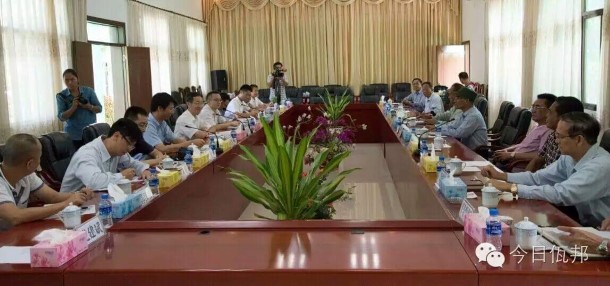China’s Special Envoy on Asian Affairs Sun Guoxiang has met with two ethnic armed groups based along the Burma-China border, encouraging them to take part in the “21st Century Panglong” peace conference, scheduled to begin on August 31.
Sun Guoxiang met on Tuesday with the United Wa State Army (UWSA), Burma’s most powerful non-state armed group, in their headquarters of Pangshang in northern Shan State. On Wednesday, he met with the National Democratic Alliance Army (NDAA) in their headquarters of Mongla in eastern Shan State.
“[China] does not interfere in the affairs of our country. This is their policy. But, [the Chinese envoy] told us that it is important to be involved in the peace process, because China wants to see peace and stability along its border [with Burma],” said Kyi Myint, who represented the NDAA (popularly known as the Mongla Group) at the Wednesday meeting,
Kyi Myint said his armed group would attend the peace conference. He expected that all ethnic armed groups would be able to attend. If there are problems, they can be “discussed and solved” at the conference, he said.
The Burma Army has insisted that three ethnic armed groups—the Ta’ang National Liberation Army, the Arakan Army and Myanmar National Democratic Alliance Army—make a pledge to disarm before taking part in the peace conference; the three groups have refused, insisting instead that the Burma Army commit to halting all offensives against them.
Kyi Myint downplayed the significance of the Burma Army’s demand, which does not entail actual, immediate disarmament but a commitment to do so at an unspecified point in the future: the current dispute between the Burma Army and the three armed groups is “a disagreement over words,” and could readily be solved through “negotiation.”
Traditionally maintaining an aloof stance towards politics and conflict in Burma, China has recently become more vocal and demonstrative in its support of the peace process.
Chinese envoy Sun Guoxiang addressed a summit of ethnic armed groups in the Kachin State border town of Mai Ja Yang in July: he expressed confidence that all ethnic armed groups would be able to attend the peace conference, and announced that China had donated US$3 million in support of Burma’s peace process, via the UN.
There are five major ethnic armed groups based along the Chinese border: the United Wa State Army, the Kachin Independence Army, the Myanmar National Democratic Alliance Army (Kokang), the National Democratic Alliance Army (Mongla), and the Ta’ang National Liberation Army. They have benefitted from border trade agreements with China, alongside private Chinese investment.
China’s leverage over these groups is significant, leading to speculation that China may hold the key to Burma’s peace process.

















